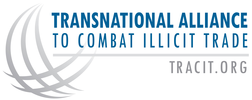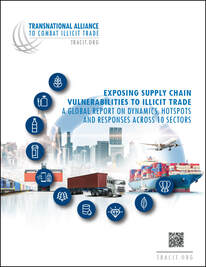KEY FINDINGS
The evolving nature of global supply chains presents significant challenges for detection and mitigation of illicit trade. The number of intermediaries and their role pose significant challenges to regulatory and control efforts, especially when a supply chain may involve up to twenty-five different entities, ranging from manufacturers to shippers and distributors. Control efforts are even more difficult when sectors combine inputs or ingredients from multiple suppliers, like electronics or food. From a trafficker’s perspective, every additional layer of complexity or fragility in the supply chain creates a new opportunity to divert goods from legitimate distribution networks and/ or disguise the illicit nature or origin of an operation.
Illicit supply chains can take diverse routes, often stretching across several countries and continents. For example, illicit wildlife trade is typically transcontinental, with virtually every country in the world playing a role as a source, transit, or destination country. Counterfeit goods are primarily sourced in China and delivered to consumers worldwide. Common to illicit trade across sectors is that traffickers employ various concealment techniques, exploit transshipment procedures and engage in origin laundering to obfuscate the true origin of goods. To avoid detection during transport, they make extensive use of false documentation, unofficial routes and border blind spots. They may also ship raw materials separately for assembly at destination points and mix illicit items with legal ones.
The wide availability of manufacturing equipment on the Internet and the significant advances made by printing technology over the past two decades have significantly lowered the barriers to entry in counterfeit markets. As a result, no specialized skills are needed to create fake packaging that is virtually undistinguishable from the original one. Interviewed companies have reported a significant increase in the quality of counterfeits. Excessive storage and destruction costs represent a particular concern for industry stakeholders affected by illicit trade practices, especially brand owners. In addition to placing an unfair burden on them, the prohibitive nature of storage costs has the effect of deterring them from contributing their knowledge and resources towards criminal investigations, inspections and related operations. |
DOWNLOAD THE FULL REPORT |
|
Transnational Alliance to Combat Illicit Trade (TRACIT) is an independent, non-governmental, not-for-profit organisation under US tax code 501(c)(6).
© COPYRIGHT 2024. ALL RIGHTS RESERVED. |
Follow us
|

